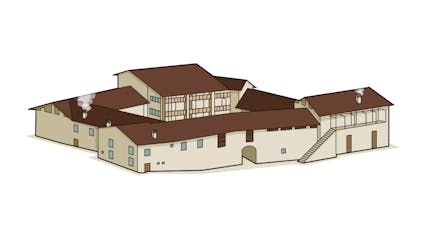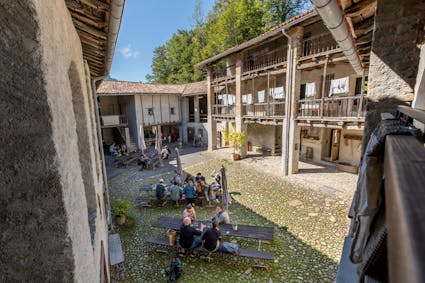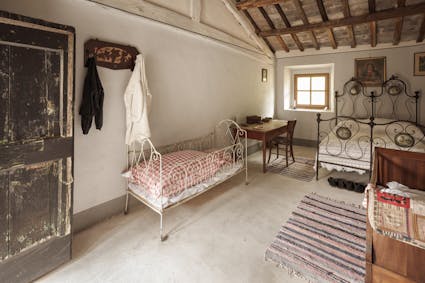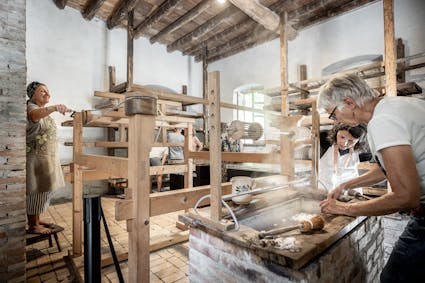851 – Farmstead from Novazzano TI, 13th–19th Century
Construction of this biggest building in the Open-Air Museum began more than 700 years ago.

The Giant of the Museum
A building complex 44 metres (144 feet) long with 50 rooms and 1,000 square metres (10,764 sq. feet) of roof surface – in 2002–2003 we needed 200 lorry loads to carry the Ticinese farm’s stone, wood and clay tiles to the Ballenberg Open-Air Museum. Construction of this biggest building in the Open-Air Museum began more than 700 years ago. Initially there was just a two-storey dwelling house opposite a stall. The present-day complex arose from these modest 13th–14th century beginnings through additions, roof-raisings and new construction following fi res, well into the 19th century.

Imported from Italy
The large enclosed farmstead is exotic to Swiss conditions. It stood in the southernmost part of the country, in the Mendrisiotto. Such farmsteads are the rule in neighbouring Italy: in the Po valley plains they were organised as production units comprising fi elds, vineyards and forests. The owners no longer lived on the farm, but as large proprietors they hired a farm manager to run it. This was so-called agro-capitalism.

Silk, Tobacco and Much More
In 1701 the noble Turconi family from Como bought this 21-hectare (52 acre) domain. Alfonso Maria Turconi willed the farm to the Beata Virgine Hospital and they took over in 1824. They made a big addition for raising silkworms in 1845. In the 1920’s and 1930’s tobacco was the most important source of income; the leaves were dried on the galleries of the farmhouses. At that time four families lived on the farm, 28 persons in all. Subsequent to the 1960’s the farm gradually depopulated and in 1999 the homeless lived there and teenagers were using it for parties.

What can you see now in Novazzano where this farmstead used to stand?
Where labourers once passed the night, now road and rail traffic zooms by.
Ballenberg
Swiss Open-Air Museum
Museumsstrasse 100
CH-3858 Hofstetten bei Brienz
Opening hours Administration
3 November 2025 to 8 April 2026
From Monday to Friday
8.30 am to 11.30 am
1.30 pm to 4.30 pm
Opening hours
9 April to 1 November 2026
10 am to 5 pm daily